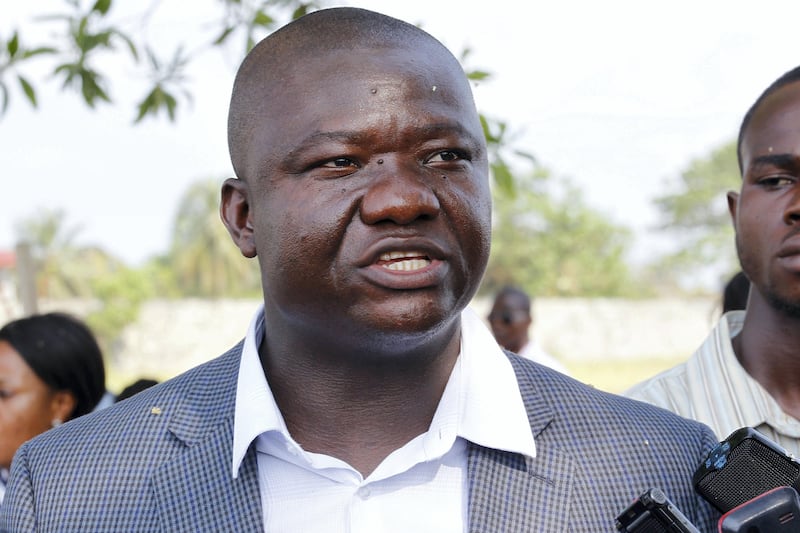Tolbert Nyenswah has vivid memories of the day when Liberia's Ebola crisis quite literally hit home. As an assistant minister of health, he was already working round the clock at the office, desperately trying to keep the health care system from collapse.
With scores of medics already infected and most of the country's hospitals shutting, it already looked like it couldn't get worse — then, as he headed home one day, it did. Lining up outside the gate of his house were families carrying Ebola-ridden corpses, demanding to know what he was going to do with them.
"It really was terrifying, a moment I will never forget," Mr Nyenswah told The National in an interview marking three years since Liberia's Ebola crisis reached its height. "We were short of teams to collect and dispose of the dead, and people who knew where I lived began to get agitated and started to take bodies to my front gate.
"Some brought bodies in cars and taxis, some brought them in wheelbarrows. Others even carried them with their bare hands and getting infected themselves. My wife and I managed to prevent our children seeing what was happening, but for a while we had to relocate to a hotel and live there instead."
Horrifying as it was, the scene outside Mr Nyenswah's front door was not unusual during the height of the Ebola crisis, when the government found itself completely overwhelmed.
The country's war-ravaged health service was barely functional as it was, and when the virus swept across the border from neighbouring Guinea in early 2014, some 80 medics got infected by unwittingly treating Ebola-positive patients.
Many others felt too scared to turn up to work, forcing most hospitals and clinics to shut altogether. With few specialist Ebola treatment clinics yet to open, corpses were often dumped outside hospitals or left in the streets.
Mr Nyenswah held crisis meetings with the country's president, Ellen Johnson Sirleaf, and they would sit feeling confused, bewildered, utterly out of their depth. They soon realised that only a massive foreign aid effort would avert all-out catastrophe, and with the help of teams of doctors from Médecins Sans Frontières and a 3,000-strong humanitarian force of US troops, Liberia finally had enough Ebola treatment clinics built to stop the outbreak gathering pace.
Mr Nyenswah and his colleagues led a public health campaign, urging people to wash their hands regularly and avoid touching anyone suspected of having the virus. Arguably the most effective educator, though, was the rapidly rising death toll.
By the time the country was finally declared free of Ebola in June 2016, Liberians had accounted for 4,810 of the 11,300 victims across West Africa. With only five million people, the tiny nation suffered much greater proportional losses than its bigger neighbours Guinea and Sierra Leone.
Today, the health service is only just recovering from the paralysis it suffered, which also threatened the progress of immunisation programmes for other killer illnesses. But Mr Nyenswah insists that valuable public health lessons have been learnt — and not just how to avoid a repeat of Ebola.
Thanks to a new network of 15 emergency disease control and reporting centres, the government can now respond far quicker to fresh epidemics.
"Just recently we had a meningitis outbreak that infected 111 people, which were able to bring under control very quickly," Mr Nyenswah said. "In the end, only 13 people died, whereas in the past meningitis outbreaks could have a 90 per cent fatality rate.”
“We've been able to the same for outbreaks of measles, Lassa fever and cholera, plus when we had a resurgence of Ebola after the main outbreak finished, it only took us two days to detect it. In the old days it took 90 days."
Mr Nyenswah himself has changed too. During the outbreak he cut a haggard, forlorn figure, dressed in dishevelled clothes and pleading with foreign journalists to publicise his pleas for outside help.
Today, by contrast, he is back in a smart suit and tie, and talks proudly of how the bad old days are now gone. He has also been moved to a fresh post as director-general of Liberia's National Public Health Institute, which this month began work on building a new bio-hazards laboratory that is due to open in 2019.
Part-funded by the US Department of Defence, the institute will be an on-the-ground facility for monitoring and detecting infectious diseases in West Africa, for which the lush, dense Liberian rainforest can act as a prime incubator.
Yet all the hi-tech solutions in the world, Dr Nyenswah argues, are little substitute for basic hygiene principles such as washing hands with soap and water.
During the Ebola outbreak, so many more Liberians began observing such precautions that a much-feared outbreak of cholera — predicted as a result of the collapse of government services — never materialised. But now that the threat from the virus has gone, he says, bad old habits are creeping back.
"Now people have let down their guard, they are getting complacent and not practising hygiene properly unless they see some obvious risk," he said. "But I am not too worried. There is always the chance of Ebola resurging, but with the level of training we now have, I think we'd be able to deal with it."





